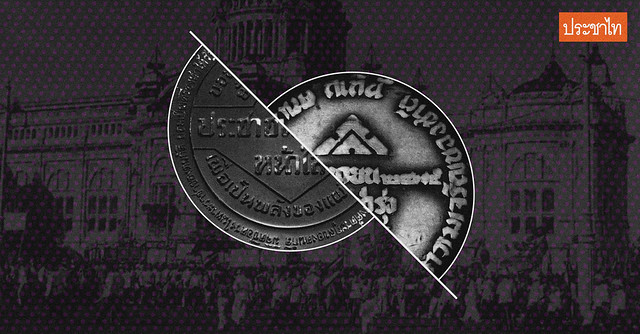The authorities have accused a politician known for his anti-junta stand of committing a computer crime for posting on Facebook that the missing 1932 Revolution Plaque is a national asset.
On 19 April 2017, Pol Gen Srivara Ransibrahmanakul, the Deputy Chief of the Royal Thai Police (RTP), revealed that the Technology Crime Suppression Division (TCSD) filed a complaint against Watana Muangsook, a politician from the Pheu Thai Party, for breaching the Computer Crime Act.
The TCSD accused him of posting false information on the internet in claiming that the 1932 Revolution plaque is a ‘national asset’ in order to call for people to demand its return, adding that the post might also incite chaos.
Part of Watana’s Facebook status posted on 17 April reads “Under Article 4 of the 1961 Ancient Monuments, Antiques, Objects of Art and National Museums Act, the plaque is considered a national heritage.”
According to his latest Facebook post, Watana will report to the TCSD at 1 pm on 20 April.
Despite its historical importance, the missing plaque, installed four years after the People’s Party (Khana Ratsadon) staged a bloodless coup d’état on 24 June 1932 to end 150 years of absolutist rule of the Chakri Dynasty, has not been registered under the Fine Arts Department as a national asset.
Last week, Fine Arts Department Director-General Anan Chuchote said his Department is not responsible for the removal, adding that it is not the job of the Department to take care of the plaque in any case.
On Tuesday, the military detained Srisuwan Janya, a transparency activist, for 10 hours for attempting to submit a letter to the junta leader to call for the return of the missing plaque and for prosecution of those responsible for its removal.
Several activists have lodged complaints to the police and Bangkok Metropolitan Administration (BMA) about the missing plaque, leading Pol Gen Srivara to say on Wednesday that the complainants might be prosecuted for filing false charges.
No one knows when exactly the plaque was removed, but a new plaque was found in its place and made headlines nationwide on 14 April. The replacement prompted public outcry, especially among democracy activists, progressives, and academics.
The old plaque might have been removed between 4-5 April during renovations of the area around the Equestrian Statue of King Rama V when tents were installed to cover the area.
The message written on the old plaque reads “At this place, at the dawn of 24 June 1932, we the People’s Party have given birth to the Constitution for the progress of the nation.”
It was replaced with another plaque with the message “May Siam prosper forever [with] happy fresh-faced citizens to be the force of the nation.” and around the rim “Respect and loyalty to the Buddhist Triple Gems, to one’s family clan, and being honest towards one’s King are tools for making the state prosper.”

The Happy Fresh-Faced Citizens Plaque (left) VS. the 1932 Revolution Plaque
Since 2007, Prachatai English has been covering underreported issues in Thailand, especially about democratization and human rights, despite the risk and pressure from the law and the authorities. However, with only 2 full-time reporters and increasing annual operating costs, keeping our work going is a challenge. Your support will ensure we stay a professional media source and be able to expand our team to meet the challenges and deliver timely and in-depth reporting.
• Simple steps to support Prachatai English
1. Bank transfer to account “โครงการหนังสือพิมพ์อินเทอร์เน็ต ประชาไท” or “Prachatai Online Newspaper” 091-0-21689-4, Krungthai Bank
2. Or, Transfer money via Paypal, to e-mail address: [email protected], please leave a comment on the transaction as “For Prachatai English”
